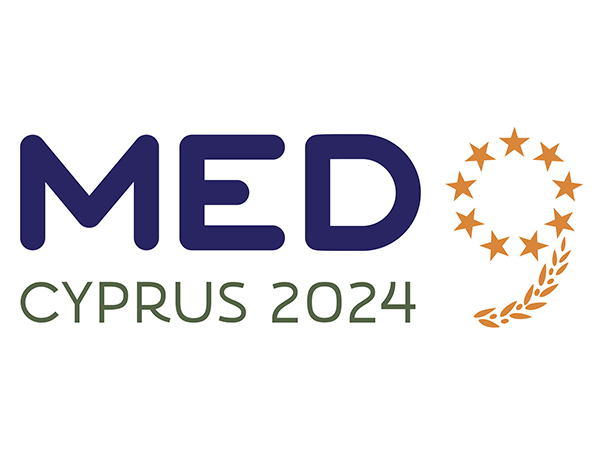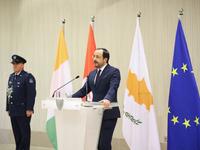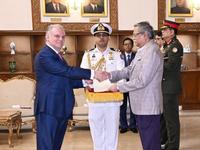Press Releases

11-10-2024 19:12
Declaration of the 11th Summit of the Southern EU Countries (MED9) Pafos, Cyprus
We, the Heads of State and Government of Croatia, Cyprus, France, Greece, Italy, Malta, Slovenia and Spain, and the Minister of State and Foreign Affairs of Portugal, met on October 11th 2024 in Paphos, for the 11th Summit of the Southern countries of the EU (MED 9).
Against the backdrop of the escalating conflict in the Middle East, Russia’s ongoing war of aggression against Ukraine, and unabating political, economic and social pressures, this format of regional coordination has an important input towards shaping European responses to common challenges. Together we will strive to turn challenges into opportunities and look to the future with resolve, in line with our citizens’ aspirations.
The beginning of the new institutional cycle and the adoption of the Strategic Agenda 2024-2029 provides additional impetus to our discussions, including on identifying issues of particular relevance to the Southern countries of the EU and on ways to promote our priorities in the framework of EU policies during the new legislative period.
We welcome the re-establishment of a portfolio dedicated to the Mediterranean within the European Commission. This confirms the EU’s increased focus on the Mediterranean and the importance attached to our region’s strategic role. We stand ready to actively engage in formulating the new Pact for the Mediterranean. The stability, security and prosperity of Europe is closely interlinked with that of its immediate neighbourhood. We remain, therefore, firmly committed to contributing to closer relations and cooperation with the countries of the Southern Neighbourhood, also in the framework of the Union for the Mediterranean, to our mutual benefit.
The unfolding situation in the Middle East is gravely alarming. In light of the reverberations of the Gaza conflict on the wider region, we express our extreme concern with the escalation of the military confrontation between Israel and Hezbollah. We call for an immediate ceasefire across the Blue Line and for the timely provision of humanitarian aid in Lebanon. We deplore the many civilian casualties, the destruction of civilian infrastructure, the high number of internally displaced persons, and we urge all actors to respect International Law and International Humanitarian Law in all circumstances. Hezbollah‘s firing of rockets and other projectiles into Israeli territory since 8th October 2023 has to stop. The sovereignty of both Israel and Lebanon has to be preserved and guaranteed, and any operations in violation of it must stop. Any further military intervention would dramatically aggravate the situation. Reaffirming our commitment to the full implementation of UN Security Council Resolution 1701, we call on all actors to exercise restraint and engage in mediating efforts to defuse tensions, whereas we will continue advocating for further support to Lebanon and its people, including to the Lebanese Armed Forces which are called to play a critical stabilizing role. We also support the fundamental stabilization role of UNIFIL in Southern Lebanon. We condemn the targeting of UNIFIL and recall that all peacekeepers must be protected.
The present escalation further compounds Lebanon’s refugee crisis. We confirm our determination to support the most vulnerable people in Lebanon, including internally displaced persons, refugees, and host communities in need, as well as providing support to combat human trafficking and smuggling. We reaffirm the need to achieve conditions for save, voluntary, and dignified returns of Syrian refugees, as defined by UNHCR. We look forward to the conference for the people and sovereignty of Lebanon to be held in Paris on October 24th.
We firmly condemn the Iranian missile attack against Israel. We call on all actors to act responsibly and refrain from further military actions.
We reiterate our condemnation in the strongest terms of the brutal terrorist attacks by Hamas against Israel and we deplore all civilian loss of life, in particular the high toll on children and women. We call for the full and immediate implementation of UN Security Council resolution 2735 and underscore our full backing to the proposed comprehensive deal that shall lead, without further delay, to an immediate ceasefire in Gaza, the release of all hostages and the provision of full, secure, and unimpeded humanitarian aid at scale to Gaza. We reiterate the primacy of land corridors, noting that all routes, of land, air, and sea, including the Cyprus Maritime Corridor, are valuable in helping to meet the vast humanitarian needs of civilians in Gaza. We strongly condemn the ongoing extremist settler violence in the West Bank, including East Jerusalem. We also call for safe access to the holy sites and for the Status Quo to be upheld.
We remain committed to a lasting and sustainable peace, in accordance with the relevant resolutions of the UN Security Council, on the basis of the two-state solution, with the State of Israel and an independent, democratic, contiguous, sovereign and viable State of Palestine living side-by-side in peace, security, and mutual recognition. To this end, we will exert every effort to revive the political process, in coordination with international and regional partners. We will continue assisting the Palestinian Authority in its reform and capacity-building efforts.
We welcome the efforts of the UN Secretary-General in the pursuit of lasting peace and protection of civilians in the region.
In line with UN Security Council resolution 2722, we condemn the ongoing Houthi attacks against vessels in the Red Sea and beyond, we reaffirm our commitment to ensuring freedom of navigation and maritime security, and we recall the prerogative of countries to defend their vessels in accordance with international law. We express our support to EUNAVFOR Aspides, which has contributed to restoring freedom of navigation in this strategically important area for global trade.
As Russia’s war of aggression against Ukraine continues for the third year, we reaffirm our unwavering support for Ukraine’s independence, sovereignty, and territorial integrity, within its internationally recognized borders. We reaffirm, once again, our steadfast commitment to providing continued multifaceted support to Ukraine and its people for as long as it takes. We also reiterate our commitment to assisting Ukraine’s recovery and reconstruction, in coordination with partners, and with a special focus to meeting the country’s energy needs in view of the upcoming winter. To this end, we look forward to the next Ukraine Recovery Conference that will be hosted by Italy in 2025. We welcome the outcome of the June Summit on Peace in Ukraine, and we will continue our outreach efforts to support a comprehensive, just and lasting peace, based on the principles of the UN Charter and international law. We commend all efforts in this regard, including the third Ukraine–South East Europe Summit held in Croatia on 9th October. We also welcome the adoption of the negotiating framework and the holding of the first Intergovernmental Conference on the accession of Ukraine. We will continue to work closely with Ukraine and support its reform efforts on its European path.
As this year marks the tragic 50th commemoration of invasion and occupation, we reiterate our commitment to a comprehensive settlement of the Cyprus problem, within the UN framework, based on a bizonal, bicommunal federation, with political equality, as defined by the relevant UN Security Council resolutions, and in line with the principles on which the EU is founded and its acquis. The Cyprus problem is a European one. We underline that Türkiye’s concrete contribution to the speedy resumption and successful conduct of the negotiations remains crucial, constituting a key element in advancing EU-Türkiye relations. We maintain that the avoidance of unilateral actions, including actions that violate the military status quo along the ceasefire lines or encroachment into the buffer zone, is essential for creating a conducive environment for the resumption of negotiations.
We underline the EU’s strategic interest in a stable and secure environment in the Eastern Mediterranean and in the development of a cooperative and mutually beneficial relationship with Türkiye, in line with established conditionalities. Solutions to outstanding issues should be addressed by peaceful means and in full respect of international law, including UNCLOS. The sovereignty and territorial integrity of all EU member states must be upheld, and their sovereign rights be fully respected. De-escalation of tensions, respect of international law, and promotion of good-neighbourly relations are essential for regional stability and cooperation, including in the field of energy. In this regard, we note that the East Mediterranean Gas Forum constitutes a platform for positive regional cooperation.
We commend the role played by the African Union in promoting effective governance, peace, security, and sustainable development, and we support its efforts to address the continent’s multifaceted challenges through the implementation of Agenda 2063. We reiterate our commitment to supporting African governments, institutions, and peoples, through a renewed partnership among equals, to contribute to a shared path to socioeconomic growth and to tackle the root causes of terrorism, violent extremism and instability. Development and democracy are mutually reinforcing, and, in this context, we underscore the importance of free and fair elections.
In a rapidly evolving and volatile geopolitical landscape, portrayed by increasing competitions and complex challenges, ensuring the Union’s strategic autonomy, economic security and resilience is our priority. We thus welcome the renewed sharp focus placed on strengthening the Union’s competitiveness, productivity, and sustainable growth, including by the reports of Mario Draghi and Enrico Letta. It is our strong conviction that a more competitive and sovereign Europe requires significant investments, with a combination of both public financing from the EU budget and the EIB group, and private sources where completing the Capital Markets Union will be key. In this context, the new Multiannual Financial Framework should also reflect the centrality of European competitiveness and match the level of political ambition with the necessary resources.
The Single Market remains our most important competitive advantage, whose untapped potential we must harness. In this regard, we shall strive to deepen the Single Market and foster a fair, inclusive, and business-friendly environment, by removing barriers, addressing fragmentation, cutting red tape, and ensuring a level playing field, taking into account Member States’ geographical specificities and the needs of micro-, small- and medium-sized enterprises, which constitute the backbone of the EU’s economy. A strong focus should be placed on deepening a truly internal market, inter alia for the services, energy, defence, communications, and digital sectors. We invite the Commission to make simplification a top priority, including by significantly reducing the administrative and compliance burden on companies and national authorities, preventing over-regulation, and ensuring enforcement of EU rules.
As research and innovation play a crucial role in bolstering European competitiveness, the EU should be at the spearhead of cutting-edge technologies, building up our own capacity in sensitive sectors and key technologies of the future, as well as on the advantages of the just green and digital transitions. We will strengthen our economic security, reduce dependencies, and diversify and secure strategic supply chains. We will not allow the undermining of our open markets and we expect the EU to pursue an ambitious, robust, open and sustainable trade policy that allows fair trade agreements, opens third country markets to EU companies, creates reciprocal market access opportunities, defends EU interests, allows resilient and reliable supply chains to develop and guarantees a true level playing field.
In this context, Cohesion Policy and the Common Agricultural Policy constitute important building blocks to strengthening the EU’s competitiveness and resilience, as well as its territorial and social cohesion.
As a region at the Union’s external borders, we recognize that a competitive, resilient and truly integrated European economy needs improved internal and external connectivity, in particular air, rail, and maritime links, as well as the energy grid, and we emphasize the importance of the Trans-European Transport Network. This will also contribute towards diversifying and securing our supply chains, thus reducing the Union’s strategic dependencies. As evident from current challenges, in particular in the Red Sea, greater efforts are needed to ensure the security and competitiveness of our maritime transport connections. We also underline the importance of digital connectivity among us, with adjacent regions, and across the globe.
In full respect of the security and defence policy of certain EU Member States, we stress the need for the EU to increase its overall defence readiness and capabilities enhancing its sovereignty, and to further strengthen its defence technological and industrial base accordingly, in order to reduce its strategic dependencies and scale up its capacities. This will require to improve the European defence industry’s access to public and private finance.
At the same time, the welfare and economic prosperity of our citizens, as well as solutions to labour market, housing, and addressing demographic challenges in a horizontal way, must remain at the epicentre of our efforts. Strengthening European health cooperation and improving access to medicines across the Union is also imperative.
The social dimension, notably reduction of inequalities, social inclusion, and protection and empowerment of citizens, remains a collective priority, in line with the European Pillar of Social Rights, the 2021 Porto declaration and this year’s Val Duchesse summit. As discussed during the first Med9 meeting of Education Ministers in Limassol in June 2024, education can be collectively strengthened in our region, including through the Euro-Mediterranean university EMUNI and relevant initiatives, with a view to building regional capacity and thus becoming a key driver for the twin transition, empowering youth to take action in creating more sustainable, resilient, and just societies.
We will continue working towards transforming the Mediterranean and Southern Europe region into a hub of energy corridors and interconnections between us and with Mediterranean partners, with a view to contributing to the objectives of the energy transition and to the Union’s energy security, as well as to the completion of the internal energy market, while ensuring affordable prices for our companies and households. To this end, we welcome the continued efforts of our Energy Ministers during the second Med9 Ministerial Meeting on Energy in September 2024 in Larnaca.
Irregular migration is a European challenge that requires a European response. We have made significant progress with the adoption of the European Pact on Asylum and Migration, the effective and timely implementation of which we prioritize, together with a truly comprehensive and holistic approach on the external dimension, so as to tackle the root causes of irregular migration and prevent primary and secondary movements. To this end, it is incumbent on us to work together on the implementation of the Action Plans we have adopted, and further expand the comprehensive partnerships approach with key countries of interest around the Mediterranean, in Africa, and other key countries of origin and transit, making full and systematic use of EU leverage to increase return and readmission policies. To enhance prevention of irregular arrivals and loss of life on all routes, we will focus our efforts to dismantling smuggling networks, and strengthening border management. While respecting the protection of international rights and obligations, we will also work towards improving the framework for returns, to increase the return rate of failed asylum applicants and other third country nationals who have no legal right to stay in the Union,, and we will consider new ways to prevent and counter irregular migration. We will also develop legal migration pathways, corresponding to the requirements of Member States. Such complex and sensitive issues necessitate the allocation of adequate EU funding in the coming years.
The Mediterranean region is particularly impacted by increased risks as a result of climate change, including natural disasters, extreme weather events, drought, and desertification. To address these challenges, enhanced regional cooperation between us and with Southern Neighbourhood countries is required, as well as strengthening of the Union Civil Protection Mechanism and related climate disaster funds. We reiterate our willingness to contribute to the EU 2040 climate target in the context of reaching neutrality at the latest by 2050 and to strengthen our cooperation on protection of our shared environment, on climate adaptation and on increasing resilience of our societies, ecosystems and infrastructure against the effects of climate change.
Healthy and thriving ecosystems are the foundation of a sustainable blue economy, promoting economic growth and innovation, job creation, and resilient coastal communities. We underline the importance of sustainably managing our shared marine resources. Marine protection is of particular importance in this regard, in line with the 2030 biodiversity strategy. We welcome the outcome and commitments from the 9th Our Ocean Conference held in Greece last April, as well as the second UN Ocean Conference co-hosted by Kenya and Portugal in 2022, and we look forward to the third UN Ocean Conference in France next year. We also take note of the Commission’s intention for a European Oceans Pact.
Our region’s water scarcity seriously affects our countries’ agricultural production, food security, rural economic stability and biodiversity. As discussed during the first Med9 Ministerial meeting on Agriculture in the Famagusta district in September 2024, we commit to implementing sustainable water management practices in agriculture, using innovative technological solutions, engaging in research and promoting efficient use of water. At the same time, we invite the European Commission to swiftly proceed with the European Water Resilience Strategy, taking into account local and regional specificities, and to simplify and provide adequate flexibility in water management measures. We look forward to the 10th meeting of the Parties of the Water Convention in Slovenia later this month.
Enlargement is a geostrategic investment in peace, security, stability, and prosperity. We will continue supporting partners based on fair and rigorous conditionality, the principle of own merits, and reversibility. We will continue encouraging reform efforts, particularly on the rule of law, as well as regional integration, good neighbourly relations, the resolution of bilateral disputes and issues rooted in the legacy of the past, and full CFSP alignment. Against this backdrop, we reconfirm our full and unequivocal commitment to the EU membership perspective of the Western Balkans, and we welcome the opening of negotiations with Bosnia and Herzegovina, and Moldova. At the same time, we reiterate the need to lay the necessary internal groundwork and reforms, to ensure that both the EU and future Member States will be ready at the time of accession.
Culture is the basis of our European identity and an integral part of sustainable development. Following the September online meeting which resulted in a joint declaration on cultural rights, the first physical Med9 Ministerial meeting on Culture will convene in November in Brussels, to discuss ways to support artistic freedom and promote Mediterranean cultural heritage in a spirit of diversity, equity, and inclusion.
Further to the meetings in Alicante in 2022 and in Valetta in 2023, we reiterate the need to further enhance coordination and explore ways of expanding our areas of cooperation. Our aim is to consolidate the Med9 as a driving force with an enhanced and constructive role within the Union.
Our next Summits will take place in Slovenia in 2025 and Croatia in 2026.
(NZ/GS)
Relevant Press Releases


29-03-2025 14:57
Travel Advice of the Ministry of Foreign Affairs for South Sudan

28-03-2025 12:16
The Ambassador of Cyprus to Thailand presented his credentials

28-03-2025 12:13
The Ambassador of Cyprus to Iraq presents his credentials



